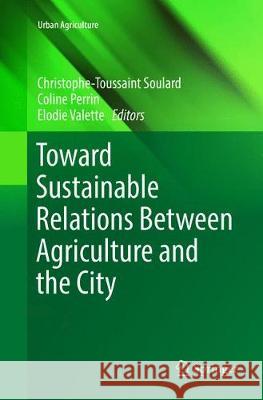Toward Sustainable Relations Between Agriculture and the City » książka
topmenu



ISBN-13: 9783319890326 / Angielski / Miękka / 2019 / 239 str.
ISBN-13: 9783319890326 / Angielski / Miękka / 2019 / 239 str.
Chapter 1. Relations between agriculture and the city in Europe and the Mediterranean
Christophe-Toussaint Soulard, Coline Perrin & Elodie Valette
Part 1. Systemic approaches of agricultural- urban relations
Chapter 2. Food, integrating urban and agricultural dynamics in Pisa, Italy
Sylvie Lardon, Marie Houdart, Salma Loudiyi, Rosalia Filippini, Elisa Marraccini
Chapter 3. Logistic issues and impacts of short food supply chains: case studies in Nord – Pas de Calais, France
Amélie Gonçalves, Thomas Zeroual
Chapter 4. Interactions between agriculture and the city : a systemic approach to examine sustainability in Meknes (Morocco)
Jean-Pierre Chery, Elodie Valette, Patrick Dugué, Pascale Philifert, Abdellaoui El Hassane
Chapter 5. Urban farms under pressure: Cairo’s dairy producers, Egypt
Annabelle Daburon
Part 2. Methods and tools to design sustainable urban food systems
Chapter 6. An Ecological Footprint-based Spatial Zoning Approach for Sustainable Metropolitan Agro-Food Systems
Dirk Wascher, Leonne Jeurissen, Jan-Eelco Jansma, Michiel van Eupen
Chapter 7. Food cells and food nodes. Two new concepts for rethinking traditional urban and food planning practices. The case of Barcelona’s Metropolitan Region
Sonia Callau, Josep Montasell, Andreu Vila
Chapter 8. The integration between Mediterranean cities and agriculture in local projects. A conceptual framework
Salma Loudiyi, Christophe-Toussaint Soulard, Patricia Abrantes, Sylvie Lardon, Guilhem Mousselin, Pascale Scheromm, Elodie Valette, Ouassila Bendjaballah, Françoise Jarrige
Part 3. Inventory of changes in urban agriculture
Chapter 9. Innovative Commercial Urban Agriculture in the Paris metropolitan area
Christine Aubry, Anne-Cécile Daniel
Chapter 10. Zero-Acreage Farming: challenges and opportunities for urban policies and partnerships
Susanne Thomaier
Chapter 11. The emergence of Municipal Allotment Gardens in Greece in times of crisis. Governance challenges for new urban gardening practices
Theodosia Anthopoulou, Sofia Nikolaidou, M Partalidou, M. Petrou
Chapter 12. The proliferation of collective gardens in Lisbon (Portugal) and Montpellier (France): urban residents demand and municipal support
Pascale Scheromm, Guilhem Mousselin
Chapter 13. The urban agriculture governance in the city of Zurich
Ingrid Jahrl, Otto Schmid
Index
Christophe-Toussaint Soulard is a senior researcher at INRA (The French Institute for Agricultural Research). Head of the research team “Agricity” of the Innovation research unit in Montpellier, France, he conducts research on sustainable agriculture and urban food systems. Holding a PhD in geography (Paris Sorbonne University, 1999), he leads research and action-research projects, and supervises doctoral theses in France, with comparisons in the Mediterranean (Lebanon, Portugal, Tunisia) and with the United States (Portland).
Coline Perrin is a researcher at INRA (The French Institute for Agricultural Research). Member of the research team “Agricity” of the UMR Innovation in Montpellier, France, she conducts researches on farmland farmland management on the urban fringe planning. PhD in geography (Aix-Marseille and Firenze Florence Universities, 2009), she leads the research project JASMINN dealing with farmland protection, urban planning and spatial justice on the urban fringe, in France, Italy and other Mediterranean countries.
Elodie Valette is researcher at CIRAD (The French Agricultural Research and International Cooperation Institute). She is member of the joint research unit Art-Dev in Montpellier, France. She has a PhD in geography (Paris Diderot University, 2003) and leads research projects dealing with agriculture, governance and urban planning, in Africa and Maghreb.This book gives an overview of frameworks, methods, and case studies for the analysis of the relations between agriculture and the city, in Europe and the Mediterranean. One of its general objectives is to show, through a diversity of case studies, how local actors (private actors, civil society and public decision - makers) deal with and interact over agriculture, food and urban development. It also aims to show how actors innovate through new activities, organizations, institutions and territories. Another key objective is finally to provide frameworks and methodological approaches for what could be called “agri-urban studies”.
The three parts of the book provide a set of approaches of the sustainability of urban food systems from an actors’ perspective. Part 1 presents systemic approaches of agricultural-urban interactions at the city-region scale in France, Egypt, Italy and Morocco. Local food issues, agriculture-urban relations, short food chains and urban livestock are taken as examples to develop systemic approaches, mobilizing both integrative and dual processes linking agriculture and the city. Part 2 deals with methods and tools for urban planning and local development, in order to design and assess sustainable food systems. At the city-region scale, chapters illustrate how actors can set relevant boundaries of a sustainable foodshed, design tools including local food supply In urban planning, and evaluate contributions of local projects to sustainability. Part 3 identifies and recounts the recent changes in urban agriculture and the new forms of governance which are emerging in European cities (Athens, Berlin, Lisboa, Montpellier, Paris and Zurich). Referring to urban agriculture, chapters show how sustainable pathways can be fostered by a wide range of multiscale grassroots initiatives (farms, collective gardens, buildings, urban green areas …) embedded in transitioning trends of sustainable development.
1997-2026 DolnySlask.com Agencja Internetowa







